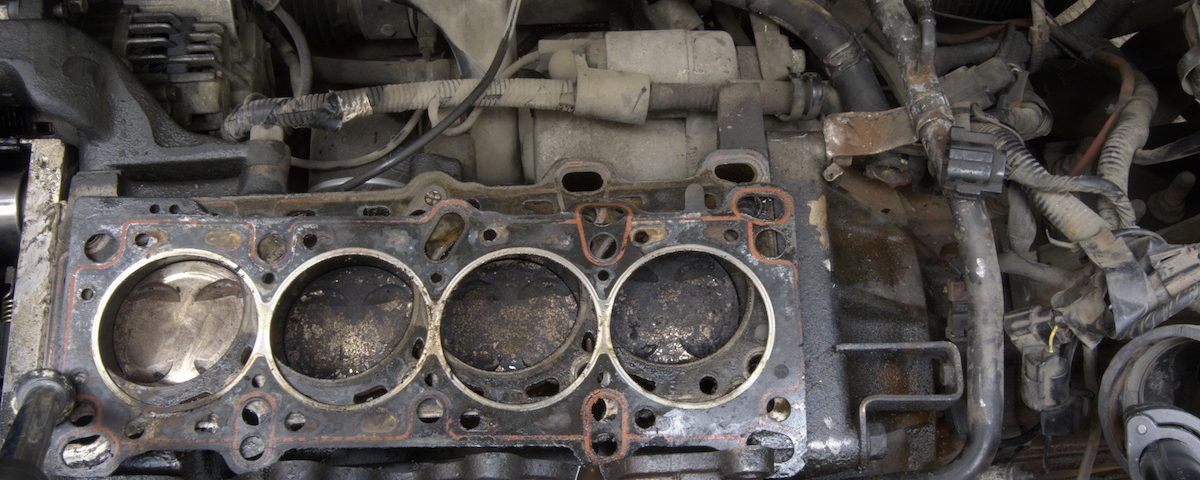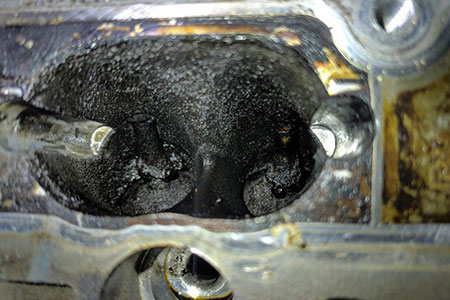

We see a lot of carbon build-up on the intake manifolds in direct-injection model vehicles here in the shop. While the issue can happen in different models, it does seem to be the most common in VWs and Audis. We see it so often that we recommend having it cleaned as part of your regular mileage service maintenance.
In the video, you can see an example of a manifold from a 2.0L TSI direct-injection engine with excessive carbon build-up. There are different methods that people use to clean the deposits from the manifold, such as bead blasting or even just giving it a good soak. It’s a messy job, but it needs doing. Otherwise, you might start experiencing running issues with your vehicle.
 Happen?
Happen?Carbon deposits form when you have heat, pressure, and oxygen in the presence of petroleum. When fuel gets exposed to the heat and pressure inside direct-injection engines, it essentially gets “cooked.” This causes the fuel to polymerize, and the polymerized fuel particles then react with oxygen to form carbon deposits.
While carbon build-up is an unfortunate thing to deal with, it is not a sign of a flaw in these vehicles. In older model cars, the fuel would move through the intake valves, which would help clear them of deposits. With newer vehicles that use direct-injection, the fuel is shot straight into the combustion chamber instead of passing through the valves first. Though this does leave direct-injection models susceptible to carbon deposits, it is much more efficient. Car designers can better account for the fuel using this method. By doing so, it allows them to extract the most energy to produce the lowest possible amount of pollution.
Though carbon-build up is a common issue for some car owners, they should not ignore the problem. If left unaddressed, carbon deposits can cause severe damage to a vehicle. Some signs that your direct-injecting vehicle might be suffering from carbon-build up are:
If you own a direct-injection vehicle and your car starts experiencing any of the above problems, you should take it for maintenance immediately. If the intake manifold and cylinder heads do not get cleaned regularly, it could lead to engine failure. Even if you are not experiencing any issues yet, you should still have the carbon deposits cleaned out as a part of your regular maintenance service.
Carbon build-up is an unfortunate side-effect of direct-injection engines. However, there are steps Audi and VW owners can take to prevent the issue from causing severe damage. The most important thing is preventative maintenance. The intake manifold and cylinder head need cleaning every 60,000 to 80,000 miles to prevent any damage from occurring. Keeping up with your scheduled oil changes is also crucial. This will ensure the camshaft actuators are working correctly, which helps control the exposure of the intake valves. You can also have the fuel injector cleaned to keep the injectors spraying properly
At Steve’s Imports, auto repair is our passion, not just our day job. We have been providing quality service and repairs to Portland residents for more than 45 years. Whether you need recommended maintenance to rid your engine of carbon deposit build-up or are just looking for general routine service, Steve’s Imports has got you covered. Our mechanics are highly trained to handle foreign models, such as Audis and VWs. For every service, they will carefully inspect your entire vehicle to ensure nothing gets missed. No matter how long it’s been since your last inspection, we can get your car back in working order with our trusted service and repairs. Contact Steve’s Imports in Portland, OR, to schedule your vehicle for maintenance today!